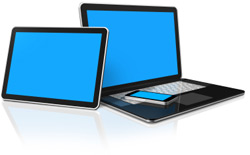
used with permission from HP Technology at Work
 If
the rumors are to be believed, 2013 will be the year that worldwide sales
of tablet PCs overtake notebooks. The second half of 2012 saw increasing
demands for tablets as new screen sizes and price points were introduced.
In fact, tablets have already outsold notebooks in China and North
America.
If
the rumors are to be believed, 2013 will be the year that worldwide sales
of tablet PCs overtake notebooks. The second half of 2012 saw increasing
demands for tablets as new screen sizes and price points were introduced.
In fact, tablets have already outsold notebooks in China and North
America.
So, where does this leave notebooks? When notebooks first entered the market, their mobility was heralded as being a technological breakthrough. These days, mobility is more of an expectation than advancement. Once tablets hit the market with their smaller-than-notebook size and almost-as-powerful-as-a-notebook processors, it was just a matter of time before the line between notebooks and tablets began to blur.
Even though a worldwide reduction in demand has caused shipments of notebooks to slow down, don't count them out just yet. The latter half of 2013 will see new processors for notebooks that will allow for more tablet-like PC features and longer battery life.
But if you're a business with a mobile workforce, you're probably not concerned about best-selling trends; you're concerned about which technology is best for your business.
The case for notebooks
The first thing you need to do when deciding between tablets and notebooks is to set aside size as one of the differentiators. Of course size is an important feature, but if it was the only feature you were interested in, you wouldn't be grappling between tablets and notebooks€you would just choose the smaller option.
That leaves you with the real nuts and bolts of each option. The core benefit of the notebook is the hardware that automatically comes with it, like a large monitor and a physical keyboard. Notebooks are bigger than tablets€there's no denying that€but notebooks like the HP EliteBook Folio also have larger screens and better resolutions than any tablet can offer. This is a perfect example of why size shouldn't be the only thing you consider when making a purchase. Showing a presentation on a tablet might be convenient, but to truly wow a customer, you'll probably be better off showing a presentation on a notebook.
Touchscreen technology has improved dramatically over the last couple of years, but some people will always love their physical QWERTY keyboard. It's easier to type on and more accurate than a touchscreen keyboard. Last, but not least, notebooks can take a beating. In fact, some notebooks are built specifically to do just that. The tablet's small size means it's more delicate and easy to break.
The case for tablets
Surprisingly, the most notable benefit of a tablet is not all of the games you can play on it, but actually how light it is. The HP ElitePad weighs less than 1.5 pounds, which means you can do business from pretty much anywhere. Thanks to touchscreen technology, you can have total control of all your features and applications with just the swipe of a finger; giving you a literal hands-on approach to your work. Where notebooks can wow with the sheer size of resolution of their monitors, tablets can wow with their touch-of-the-screen capabilities that turn boring presentations or demonstrations into interactive experiences.
The touchscreen also helps on-the-go business transactions. Whether it's having a customer electronically sign a document on your screen, or checking inventory with a couple of taps of the screen, the buying and selling process has never been more dynamic than it is today.
One of the biggest things that set tablets apart from notebooks is the apps. Just like the tablet itself, apps are built with mobility in mind, so their simple interface makes it easy for you to access the information you need. And let's not forget about the perception that tablets create. When customers see businesses using tablets, they view them as cutting-edge and ahead of the curve in terms of understanding technology.
Why choose?
Who says you have to use either a notebook or a tablet? Why not use both? Notebooks and tablets can actually be great business partners. By syncing the two products, mobile workers can have much of the same access on their tablet as they do on the notebook (and vice versa). Or maybe you want the flexibility of a tablet with the power of a notebook. Products like theHP EliteBook Revolve adapt to any situation, making it easy for you to take advantage of the benefits of both.
If you're trying to decide between tablets and notebooks, you need to look at them in terms of how you'll be using them. Do you need something that performs critical tasks or quick tasks? Notebooks are good for the former, while tablets (and in some cases, notebooks) are good for the latter.
As long as you're prepared to do some careful research and planning, and your business is committed to the implementation of whatever technology you choose to purchase, there really is no wrong answer.